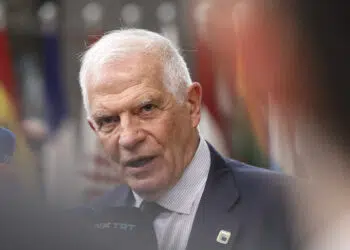Brussels – The West acts as a shield around Israel after the “unprecedented” attack by Tehran’s theocratic regime but calls for Prime Minister Netanyahu to refrain from further response against Iran. EU High Representative Josep Borrell urgently summons the foreign ministers of the 27 Member States, and European Council President Charles Michel announces that the risk of further escalation in the Middle East will be on the table of EU heads of state and government at the extraordinary summit scheduled for April 17-18.
The European institutions’ response to the launch –on the night of April 13-14 — of hundreds of drones and missiles from Iran into Israel came in concert with G7 leaders, who adjourned by teleconference as early as yesterday. “We express our full solidarity and support to Israel and its people and reaffirm our commitment towards its security. With its actions, Iran has further stepped toward the destabilization of the region and risks provoking an uncontrollable regional escalation.,” say the governments of France, Germany, Japan, Italy, the United States, Canada, and the United Kingdom in a joint statement.
“All parties must show the utmost restraint,” added European Commission President Ursula von der Leyen and Charles Michel. “We stand ready to take further measures now and in response to further destabilizing initiatives,” the G7 warned the ayatollah regime: further sanctions, particularly to hinder Tehran’s drone and missile production programs.
The European Parliament President, Roberta Metsola, also condemned “in the strongest possible terms” the unscrupulous attack in a post on X and reiterated that the EU “will continue to work to de-escalate the tension and prevent the situation from escalating into further bloodshed.” Together with G7 partners, seeking to “end the crisis in Gaza.”
Tehran to UN Security Council: “It was self-defense.”
Meanwhile, the U.N. Security Council also met yesterday, along with the permanent representatives of Israel and Iran to the United Nations. For Tehran, the operation launched on April 13 “was a form of self-defense, a necessary and proportionate action directed only against military targets,” said Ambassador Amir-Saeid Iravani. Iran’s accusation to the international community is always the same: “There are double standards.” Because the Security Council “did not condemn the attack against our consulate in Syria,” on April 1, in clear violation of the inviolability of diplomatic premises, sixteen people, including several Revolutionary Guards officers, were killed in the bombing that destroyed the Iranian embassy in Damascus. Although not explicitly claimed, the bombing was allegedly carried out by the Israel Defense Forces.
“The root causes of what is happening are obvious. Israel has caused over 30,000 civilian casualties in Gaza. The regime has also caused casualties among aid workers. This is genocide against the Palestinian population. This is a series of brutal crimes against our people, our officials, our infrastructure,” the Iranian ambassador attacked again. On the other hand, the Israeli counterpart called on the United Nations to “impose all possible sanctions on Iran before it is too late.” The Secretary-General, Antonio Guterres, “strongly condemned the escalation represented by Iran’s large-scale attack on Israel” and warned: “We need to turn back from the brink of the meltdown we are in.”
Tomorrow at 5 p.m., the foreign ministers of EU countries will meet by videoconference for an initial discussion on what the EU intends to do to help de-escalate and avert a further Israeli response. Meanwhile, Borrell has contacted Iranian Foreign Minister Hossein Amir-Abdollahian to dissuade him from further action, while Netanyahu–under U.S. pressure–has let it be known that, at the moment, Tel Aviv “will not extend military operations” but that Iran “will pay.”
English version by the Translation Service of Withub






